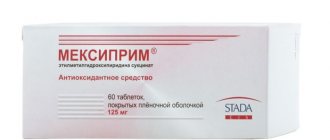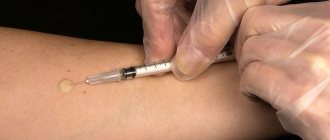pharmachologic effect
Diover is a diuretic.
Pharmacodynamics
Torsemide is a loop diuretic. The maximum diuretic effect develops 2–3 hours after taking the drug orally. The main mechanism of action of the drug is due to the reversible binding of torasemide to the sodium/chlorine/potassium ion contransporter located in the apical membrane of the thick segment of the ascending limb of the loop of Henle, as a result of which the reabsorption of sodium ions is reduced or completely inhibited and the osmotic pressure of intracellular fluid and water reabsorption are reduced. Blocks myocardial aldosterone receptors, reduces fibrosis and improves myocardial diastolic function.
Torasemide causes hypokalemia to a lesser extent than furosemide, but it is more active and its action is longer lasting.
The use of torasemide is the most reasonable choice for long-term therapy.
Pharmacokinetics
After oral administration, torasemide is quickly and almost completely absorbed into the gastrointestinal tract. Cmax of torasemide in blood plasma is observed 1–2 hours after oral administration after a meal. Bioavailability is 80–90% with minor individual variations.
The diuretic effect lasts up to 18 hours, which facilitates the tolerability of therapy due to the absence of very frequent urination in the first hours after taking the drug orally, which limits the activity of patients.
Communication with blood plasma proteins is more than 99%. Apparent Vd is 16 l.
Metabolized in the liver using isoenzymes of the cytochrome P450 system. As a result of successive reactions of oxidation, hydroxylation or ring hydroxylation, three metabolites are formed (M1, M3 and M5), which bind to plasma proteins by 86, 95 and 97%, respectively.
T1/2 of torasemide and its metabolites is 3–4 hours and does not change with chronic renal failure. The total clearance of torasemide is 40 ml/min, renal clearance is 10 ml/min. On average, about 83% of the dose taken is excreted by the kidneys: unchanged (24%) and in the form of predominantly inactive metabolites (M1 - 12%, M3 - 3%, M5 - 41%).
In renal failure, T1/2 does not change, T1/2 of metabolites M3 and M5 increases. Torsemide and its metabolites are slightly eliminated by hemodialysis and hemofiltration.
In case of liver failure, the concentration of torasemide in the blood plasma increases due to a decrease in the metabolism of the drug in the liver. In patients with cardiac or liver failure, T1/2 of torasemide and the M5 metabolite is slightly increased, drug accumulation is unlikely.
Analogues of "Diuvera"
Since the diuretic “Diuver” has many contraindications for use, it is not possible to prescribe it to all patients. In such situations, doctors resort to the help of other diuretic medications belonging to the loop group. These medications have the same mechanism of action on the body as Diuver, so they are also used to get rid of swelling and lower blood pressure. They often resort to the following pharmaceuticals:
- "Britomar";
- "Trigrim";
- "Torasemide".
Contraindications
- hypersensitivity to torasemide or any of the components of the drug
- allergy to sulfonamides (sulfonamide antimicrobials or sulfonylureas)
- renal failure with anuria
- hepatic coma and precoma
- severe hypokalemia
- severe hyponatremia
- hypovolemia (with or without hypotension) or dehydration
- severe disturbances in the outflow of urine of any etiology (including unilateral damage to the urinary tract)
- glycoside intoxication
- acute glomerulonephritis
- decompensated aortic and mitral stenosis, hypertrophic obstructive cardiomyopathy
- increased central venous pressure (over 10 mm Hg)
- hyperuricemia
- lactose intolerance, lactase deficiency or glucose-galactose malabsorption
- lactation period
- age up to 18 years.
With caution: arterial hypotension, stenosing atherosclerosis of the cerebral arteries, hypoproteinemia, predisposition to hyperuricemia, disturbances in the outflow of urine (benign prostatic hyperplasia, narrowing of the urethra, or hydronephrosis), a history of ventricular arrhythmia, acute myocardial infarction (increased risk of developing cardiogenic shock), diarrhea pancreatitis, diabetes mellitus (decreased tolerance) to glucose) hepatorenal syndrome gout anemia pregnancy.
Indications
The main indication for taking the diuretic drug Diuver is edema syndrome of various origins, which can be observed in diseases of the kidneys, liver and lungs. Doctors prescribe medicine for heart failure and hypertension. For arterial hypertension, taking a diuretic is not recommended.
To relieve swelling, the doctor selects a small dosage, observing the patient, after which treatment adjustments can be made. For hypertension, it is recommended to take 5 mg Diuvera tablets once a day. Sometimes you are allowed to take the entire tablet.
To eliminate swelling due to pathologies of internal organs, doctors recommend taking 5 mg, and for chronic heart failure - up to 40 mg per day.
The dosage can be set by a qualified specialist; self-medication is unacceptable. The tablet should be taken in the morning, after meals, with plenty of water. The effect of the drug begins an hour after its use, and the maximum effect becomes noticeable after 2-3 hours.
The diuretic effect lasts for 6-18 hours, which is much longer than the effect of many other diuretics. Urination occurs evenly throughout the entire duration of the substance’s action. The diuretic is excreted through the liver, which is why it is prescribed to patients suffering from renal failure.
Diuver: instructions for use
Inside, once a day, after breakfast, with a small amount of water.
Edema syndrome of various origins, incl. for CHF, liver, lung and kidney diseases
The usual therapeutic dose is 5 mg orally once daily. If necessary, the dose should be gradually increased to 20–40 mg once a day, in some cases - up to 200 mg per day. The drug is prescribed for a long period or until the swelling disappears.
Arterial hypertension
The starting dose is 2.5 mg (1/2 5 mg tablet) once daily. If necessary, the dose can be increased to 5 mg once daily.
Elderly patients do not require dose adjustment.
Composition, properties and release forms
The drug "Diuver" is a diuretic medication. Pharmacological group - “loop diuretics”. The effect is based on slowing down the absorption of chlorine and sodium. The medicine is available in the form of white round tablets. There is a line on one side of the pill, and the inscription “915” (for a dose of 5 mg of active substance) or “916” (for a dose of 10 mg) on the other. Diuretic properties are observed due to the active substance torasemide. In addition to this, the product contains substances that are presented in the table.
Enter your pressure
Move the sliders
120
on
80
| Ingredient in pill | Purpose |
| Lactose monohydrate | Acts as a sweetener, replacing sugar in the preparation. |
| Corn starch | It is necessary to give the tablet volume, weight and ensure compression. |
| Sodium carboxymethyl starch | Guarantees the removal of active components from the tablet. Used to combine all ingredients and further pressing. |
| Silicon dioxide colloidal anhydrous | The role of the sliding component is assigned. |
| Magnesium stearate | Dietary supplement based on fat. Makes the tablet smooth and uniform. |
Side effects
From the side of water-electrolyte and acid-base balance: hyponatremia, hypochloremia, hypokalemia, hypomagnesemia, hypocalcemia, metabolic alkalosis. Symptoms indicating the development of electrolyte and acid-base balance disorders may include headache, confusion, convulsions, tetany, muscle weakness, heart rhythm disturbances and dyspeptic disorders, hypovolemia and dehydration (more often in elderly patients), which can lead to hemoconcentration with a tendency to the development of thrombosis.
From the cardiovascular system: excessive decrease in blood pressure, orthostatic hypotension, collapse, tachycardia, arrhythmias, decrease in blood volume.
Metabolism: hypercholesterolemia, hypertriglyceridemia, transient increase in the concentration of creatinine and urea in the blood, increase in the concentration of uric acid in the blood, which can cause or intensify the manifestations of gout, decrease in glucose tolerance (possible manifestation of latent diabetes mellitus).
From the urinary system: oliguria, acute urinary retention (for example, with prostatic hyperplasia, narrowing of the urethra, hydronephrosis), interstitial nephritis, hematuria, decreased potency.
From the digestive tract: nausea, vomiting, diarrhea, intrahepatic cholestasis, increased activity of liver enzymes, acute pancreatitis.
From the central nervous system, organ of hearing: hearing loss, usually reversible, and/or tinnitus, especially in patients with renal failure or hypoproteinemia (nephrotic syndrome), paresthesia.
From the skin: pruritus, urticaria, other types of rash or bullous skin lesions, erythema multiforme, exfoliative dermatitis, purpura, fever, vasculitis, eosinophilia, photosensitivity, severe anaphylactic or anaphylactoid reactions up to shock, which to date have only been described after IV administration.
From the peripheral blood: thrombocytopenia, leukopenia, agranulocytosis, aplastic or hemolytic anemia.
Diover or furosemide: which is better?
Diuver and furosemide are similar drugs, loop diuretics. They remove water and salt by acting on the loop of Henle in the kidneys. These drugs cannot be combined! Furosemide (trade name Lasix) is a rather short-acting drug (4 hours). Diuver is a medicine that appeared later. It has a longer diuretic effect (6-12 hours). It can be taken less frequently than furosemide.
Sometimes Diuver can be used in patients with kidney failure who no longer benefit from furosemide. Diuver has other important advantages over furosemide, which improve the quality of life of patients with heart failure, cirrhosis and hypertension.
Therefore, if a patient is interested in which is better - Diuver or furosemide, the doctor usually recommends the first drug.
special instructions
Before prescribing Diuver, the water and electrolyte balance should be corrected. Use with caution if you have gout or a tendency to increase uric acid levels. During long-term treatment with Diuver, it is recommended to monitor electrolyte balance, glucose, uric acid, creatinine and blood lipids. In patients with type 1 or 2 diabetes mellitus, blood glucose levels should be regularly monitored. During the treatment period, patients should avoid driving vehicles and other activities that require high concentration and speed of psychomotor reactions.
Reviews
We have selected some people's reviews about the drug Diuver:
- Olga. Diuver is a very good diuretic. Its action lasts a long time and the maximum effect from taking it appears after 1.5-2 hours. My father took these pills due to heart failure to get rid of excessive swelling (his legs were very swollen, to the point that he could not move on his own). Before diuver, we tried everything, but there was no noticeable and expected effect. I heard about it by chance in the pharmacy line and decided to buy it for a test, as the test showed - not in vain. No side effects were identified during use of the drug. The main thing is to follow the dosage and regimen. Huge advantages are the price and effectiveness of the drug.
- Catherine. Torasemide Canon was prescribed to me by an endocrinologist; the indications for use are severe swelling. I didn’t know what to wear – my feet couldn’t fit into any shoes. I liked that the medicine is gentle and there is no constant urge to go to the toilet. Already on the second day, the swelling began to go away, and a week later I noticed that weight loss began. I feel great.
In general, reviews of Diuver confirm its high effectiveness in the treatment of edema syndrome in many different pathologies. Thus, patients with chronic heart diseases, kidney damage and diseases accompanied by impaired regulation of fluid excretion from the body had a positive opinion about the drug.
Compatibility with other drugs
When used together, torasemide increases the sensitivity of the myocardium to cardiac glycosides (due to the possible development of hypokalemia and hypomagnesemia). With simultaneous use of torasemide with mineralocorticoids, glucocorticoids, and laxatives, potassium excretion may increase. With simultaneous use, torasemide enhances the effect of antihypertensive drugs. When used together, torasemide, especially in high doses, can enhance the nephro- and ototoxic effects of aminoglycoside antibiotics, the toxicity of cisplatin, the nephrotoxic effects of cephalosporins and the cardio- and neurotoxic effects of lithium preparations. When used together, torasemide may enhance the effect of peripheral muscle relaxants (coumarin derivatives) and theophylline. With the simultaneous use of torasemide with salicylates (in high doses), their toxic effect may increase. When used together, torasemide may reduce the effectiveness of hypoglycemic (antidiabetic) agents. When taking torasemide sequentially or simultaneously with ACE inhibitors, a transient drop in blood pressure may occur. If it is necessary to use such a combination, you should either reduce the initial dose of the ACE inhibitor or reduce the dose of torasemide (or temporarily discontinue it). When used together, NSAIDs and probenecid may reduce the diuretic and hypotensive effects of torasemide. Cholestyramine may reduce the absorption of torasemide from the gastrointestinal tract (based on preclinical studies in animals).
Drug interactions
Diuretic "Diuver" is not compatible with antibiotics, diabetic drugs, and ACE inhibitors.
The combined use of Diuver with antibiotics is fraught with an increase in the concentration of the latter, which subsequently leads to an increased risk of side symptoms. The combination of the described medication with medications for the treatment of diabetes provokes a decrease in the effectiveness of the latter, so it is important to adjust the dosage of the medications. If these measures are not taken, ketoacidosis and hyperglycemic coma may develop. It is not recommended to use Diuver with medications that contain lithium, since intoxication of the body may occur, which manifests itself in the form of attacks of nausea, vomiting and headaches.
Simultaneous use with non-steroidal anti-inflammatory drugs provokes a decrease in the diuretic effect of Diuver. In addition, doctors do not recommend using Diuver simultaneously with ACE inhibitors, since this can provoke a strong decrease in blood pressure, which can lead to collapse. Patients who are prone to developing kidney diseases are not prescribed the combined use of Diuver and Cyclosporine.
Overdose
Symptoms: excessively increased diuresis, accompanied by a decrease in blood volume and disturbances in the electrolyte balance of the blood, followed by a pronounced decrease in blood pressure, drowsiness, confusion, collapse, and gastrointestinal disorders are possible.
Treatment: there is no specific antidote. You should induce vomiting, perform gastric lavage, and administer activated charcoal. Reducing the dose or discontinuing the drug and simultaneously replenishing the blood volume and indicators of water-electrolyte balance and acid-base balance under the control of serum concentrations of electrolytes, hematocrit, symptomatic treatment. Hemodialysis is ineffective.
Undesirable effects
Most hypertensive patients do not experience any side effects during treatment with the diuretic Diuver. However, in rare cases, the following may occur:
- reduction of beneficial microelements in the bloodstream;
- metabolic alkalosis;
- cephalgia;
- convulsions;
- muscle weakness;
- cardiac dysfunction;
- dyspeptic disorders;
- hypovolemia;
- dehydration;
- hypotension;
- collapse;
- createninemia;
- increased symptoms of gout;
- oliguria;
- intrahepatic cholestasis;
- hearing impairment;
- hives;
- photosensitivity;
- leukopenia.
Any case of deterioration in health due to taking the diuretic "Diuver" must be notified to the attending physician.












